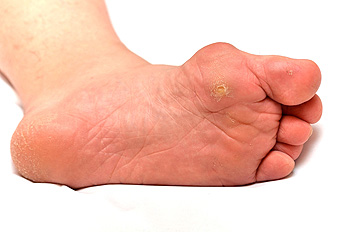 A bunion is considered to be a foot deformity that occurs on the side of the big toe. It will often begin slowly as the big toe gradually leans toward the toe next to it. A change in the structure of the foot may be a result of this, and this misalignment causes a bony protrusion to form on the side of the toe. A common cause of this condition may be because of a genetic trait that produces specific foot types, and research has shown this may be a contributing factor in the development of bunions. Choosing to wear poorly fitting shoes could make an already existing case of bunions even worse. There are several symptoms associated with the formation of bunions, which are often felt as a burning or numbing sensation. Additionally, the toe may become sore, red and tender. If you have developed a bunion, it’s suggested to consult with a podiatrist to learn about correct treatment options.
A bunion is considered to be a foot deformity that occurs on the side of the big toe. It will often begin slowly as the big toe gradually leans toward the toe next to it. A change in the structure of the foot may be a result of this, and this misalignment causes a bony protrusion to form on the side of the toe. A common cause of this condition may be because of a genetic trait that produces specific foot types, and research has shown this may be a contributing factor in the development of bunions. Choosing to wear poorly fitting shoes could make an already existing case of bunions even worse. There are several symptoms associated with the formation of bunions, which are often felt as a burning or numbing sensation. Additionally, the toe may become sore, red and tender. If you have developed a bunion, it’s suggested to consult with a podiatrist to learn about correct treatment options.
If you are suffering from bunion pain, contact one of our podiatrists of New Tampa Foot & Ankle. Our doctors can provide the care you need to keep you pain-free and on your feet.
What Is a Bunion?
Bunions are painful bony bumps that usually develop on the inside of the foot at the joint of the big toe. As the deformity increases over time, it may become painful to walk and wear shoes. Women are more likely to exacerbate existing bunions since they often wear tight, narrow shoes that shift their toes together. Bunion pain can be relieved by wearing wider shoes with enough room for the toes.
Causes
- Genetics – some people inherit feet that are more prone to bunion development
- Inflammatory Conditions - rheumatoid arthritis and polio may cause bunion development
Symptoms
- Redness and inflammation
- Pain and tenderness
- Callus or corns on the bump
- Restricted motion in the big toe
In order to diagnose your bunion, your podiatrist may ask about your medical history, symptoms, and general health. Your doctor might also order an x-ray to take a closer look at your feet. Nonsurgical treatment options include orthotics, padding, icing, changes in footwear, and medication. If nonsurgical treatments don’t alleviate your bunion pain, surgery may be necessary.
If you have any questions, please feel free to contact our office located in Wesley Chapel, FL . We offer the newest diagnostic and treatment technologies for all your foot care needs.
